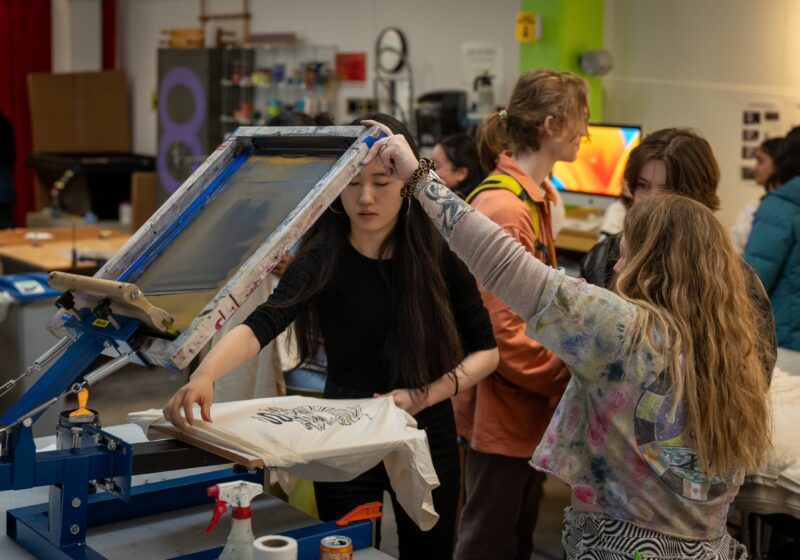Contrary to popular belief, it is possible to live off of a vegan diet. We survived seven days of it. Both of us wanted to experience a new lifestyle, adopt a healthier diet and see if we had the self-control to go without milk and cheese for a few days. But when we were asked why we were really taking on this challenge, most of the time, our rationales didn’t dispel people’s disbelief.
The week-long journey wasn’t an easy one. On the first day, we convinced ourselves that we could persist like this for a month; by the seventh, we were disillusioned. Although we were ready to go revert to our vegetarian and meat-loving selves, we took with us knowledge of mindful eating.
We started our quest with a decent understanding of what veganism really meant. Veganism is a diet and lifestyle that seeks to not use or consume any animal products. The stipulations were no dairy, no eggs and even no artificial sweeteners (conventional sugars are processed through bone char). Vegans choose this lifestyle for several reasons, including fighting for animal rights and gaining the health benefits associated with such a diet. With the right planning and a good ole vitamin supplement, a vegan diet can be as healthy, potentially healthier, than a typical diet.
Day one we both started out very eager as newly converted vegans. We enthusiastically found vegan options for breakfast, lunch and dinner. Whether it was the perfect oatmeal with raw brown sugar, the vegan chili from the Pit or teriyaki tofu from Douglass, the dining options seemed endless for us. We saw vegan in everything. To learn a bit more about why people go vegan, we attended a meeting with the Student Association of Vegan and Vegetarian Youth. Nutritionist Christian Hoh from Dining Services presented the health benefits of adopting a vegan/vegetarian lifestyle, which included lower rates of death from ischemic heart disease, lower cholesterol levels, lower blood pressure and lower rates of hypertension, diabetes and prostate and colon cancer, a lower incidence of obesity, a stronger immune system and even higher IQs, among others (according to www.goveg.com).
Members of SAVVY also took the opportunity to share with us their personal stories of how they turned to veganism/vegetarianism.
‘I believe that anything that feels pain deserves rights,” senior and Dining Services representative Laura Posner said. Other members emphasized their wishes to reduce animal suffering and increase awareness of animal rights issues. Interesting debates about whether honey is permissible in a vegan diet and what can be done to increase vegan and vegetarian options on campus ensued as well.
Toward the end of the meeting, everyone warned us that there were virtually no vegan options available on campus during the weekend. This statement foreshadowed a tough two days at the end of the week.
After dining at the vegan station for a good portion of the week, the once boundless supply of vegan options seemed to dry out. Late night study-snacks consisted of copious amounts of hummus and pretzels, soy crisps and caramel- flavored rice cakes, which soon lost their appeal, even being only 50 calories. Although soy iced chai wasn’t too bad for that caffeine boost, a late-night run for a strong cup of Dunkin Donuts was disappointing in vegan options (they didn’t even have soy milk available).
Prior to this experience, the two of us were not cognizant of what vegan options were available on campus. Although there are options offered at most of the main dining areas, they aren’t always clearly labeled. After e-mailing Dining Services with a few questions, it was comforting to learn that most breads and wraps were egg-less, although there were some surprising exceptions, like whole wheat bagels.
As college students, we realized that our frenzied schedules did not allow for ample time to cook our own meals. After speaking with other students and observing meal options, we began to see that a a successful vegan regime consists of a great deal of independent cooking. If we refine our culinary skills in teh near future, we might be able to conjure up a vegan dessert or even an entre, but for the week, we relied on our peers’ baking abilities and campus dining options. Our friends tried to deter us with pie, chocolate and even Indian food; however, we remained resilient. Milk, cheese, eggs and meat were certainly missed but we remained true to our goal.
While we’re not cutting out dairy anytime soon, we learned the extent of our ignorance of where our food comes from and the suffering other living beings endure to provide America with its favorite dishes. The experience was favorable overall; however, for the time-being, we will continue to trek down our omnivorous paths.
Leber is a member of the class of 2011.
Venkateswaran is a member of the class of 2011.





